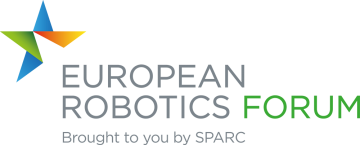ERF 2023 - BRIGHT AND DARK SIDE OF AI IN ROBOTICS

The 14th of March 2023, the Session on "BRIGHT AND DARK SIDE OF AI IN ROBOTICS" will be held within the European Robotics Forum (ERF 2023). The workshop is organized by Andrea Orlandini, Alberto Finzi (Naples University), Marco Huber (IPA Fraunhofer) and Markus Vincze (TU Wien, Austria).
** Session Program **
01.55pm - Session Introduction and Questions [PDF]
EU Vision
02.00pm Cem GULEC, Deputy Head AI and Robotics, EU Commission [PDF]
Research and Development
02.15pm Fredrik Heintz "Trustworthy Cognitive Robots - Challenges and Opportunities" TAILOR project, Linkoeping University, Sweden [PDF]
This talk will argue that the integration of AI and robotics is necessary to build trustworthy
cognitive robots that can help humanity solving the challenges we are facing. It will identify
some of the main challenges such as verification and validation of safety critical systems
and opportunities such as self-repairing and self-improving physical systems. The talk will
conclude with recommendations for realising trustworthy cognitive robots in Europe.
The talk is based on our research on intelligent collaborative unmanned aircraft systems and
the research in the TAILOR network developing the scientific foundations for Trustworthy AI
through the integration of learning, optimisation, and reasoning.
02.25pm Thomas Vögele "Can we improve Core Robotics Capabilities with Data-Driven AI?", Space robotics, DFKI, Germany
Data-driven AI such as deep-learning has the potential to improve or at least simplify
the provision of some core capabilities in robotics. Using the examples of environment
perception and motion control we will present on-going work in that direction. We will
outline potential benefits and present first results, but also discuss the challenges and
limitations of AI-driven solutions.
02.35pm Francesco Mercaldo "Opportunities in AI for cybersecurity in transport sector", Cybersecurity, IIT-CNR, Italy [PDF]
02.45pm Riccardo Muradore, Health/Surgery robots,Verona University, Italy
Robot companies
02.55pm Nima Enayati, Manufacturing, ABB Corporate Research, Germany [PDF]
03.05pm Alessandro Di Fava "Service Robotics & AI: Challenges and Opportunities", Service/logistics robots, Pal Robotics, Spain [PDF]
In this talk, we will discuss the potential of AI and robotics, exploring the challenges
and opportunities for real-world impact. Drawing on our experience with the
deployment of PAL Robotics' robots ARI and TIAGo in EU funded projects that include
use cases for real-life scenarios. We will analyse the barriers we encountered and the
opportunities we unlocked.
03.15pm Final Discussion
** Motivations and Aims **
Robotics is one of the most natural application areas for AI research.Advances in AI&Robotics (AIRO) are fostering key enabling features such as decisional autonomy, learning, interaction ability, dependability and cognitive abilities for robots. Thus it seems essential for AIRO communities to respond to the challenges that these applications pose and contribute to the advance of intelligent robotics. This session aims at highlighting the AIRO bright and dark side. The integration of well established results with cutting edge technologies, like, e.g., ML with classic model-based solutions, seems ready to be successfully deployed in real world settings. On the other hand, although impressive results have been achieved in separate fields, they are often limited to laboratory conditions. For rolling out innovative and trustworthy AI solutions to the market,further improvements and research are required.
This ERF Session has been held during the last four years (ERF21, ERF20, ERF19, ERF18 and ERF17) enlarging the scope considering also new frontiers related to Machine Learning (ML), an uprising branch of artificial intelligence that enables a robot to autonomously learn, e.g., an optimal task execution through trial-and-error interaction with its environment or learning by the human demonstration. The union of ML with classic model-based solutions such as, e.g., automated planning and execution, seems now ready to be integrated. Although impressive results have already been achieved in separate fields, they are so far often limited to laboratory conditions. For rolling out innovative, effective and safe solutions for learning and planning in robot control to industrial applications, further improvements and research is required. This workshop aims at identifiying major limitations of frontiers in the state-of-the-art.
As a more concrete goal, this proposal aims to provide an opportunity for researchers, innovators and industries communities to discuss about current results in EU funded projects, common interests and efforts, figure out shared challenges and discuss expectations about future developments in AI and Robotics. In this perspective, the aim of this ERF workshop is to facilitate interactions between researchers and practitioners in AI and Robotics, pushing recent technological advancements out of the laboratories for deploying a new generation of Intelligent Robots endowed with flexible, adaptive and goal-oriented behaviors, long-term autonomy, advanced interaction with humans in structured collaborative activities. Such synergies are also to foster the creation of new collaborations.
In this particular edition, the speakers will be asked to address three questions to figure out how AI&Robotics can have a concrete impact.
What are the most effective/safe AI & Robotics results/technologies having a real impact on the EU market?
What are the main barriers for “pushing” new AI & Robotics research results/technologies out of the labs?
What are the most relevant fields/areas in which the EC should push/finance new activities to foster the creation of new AI & Robotics synergies and pave the way towards their deployment in real settings?
More info here
AI & Robotics Sessions in Past ERF:
- AI and Robotics: Intelligent, Learning and Trustworthy Robots ERF 2021
- AI and Robotics: the challenge of complex learning and planning ERF 2020
- AI, Planning and Robotics: Results and Future Challenges ERF 2019
- A.I., Automated Planning and Robotics: Going into the wild ERF 2018
- Towards Fully Autonomous Robots: Challenges for AI Planning in Robotics ERF 2017

